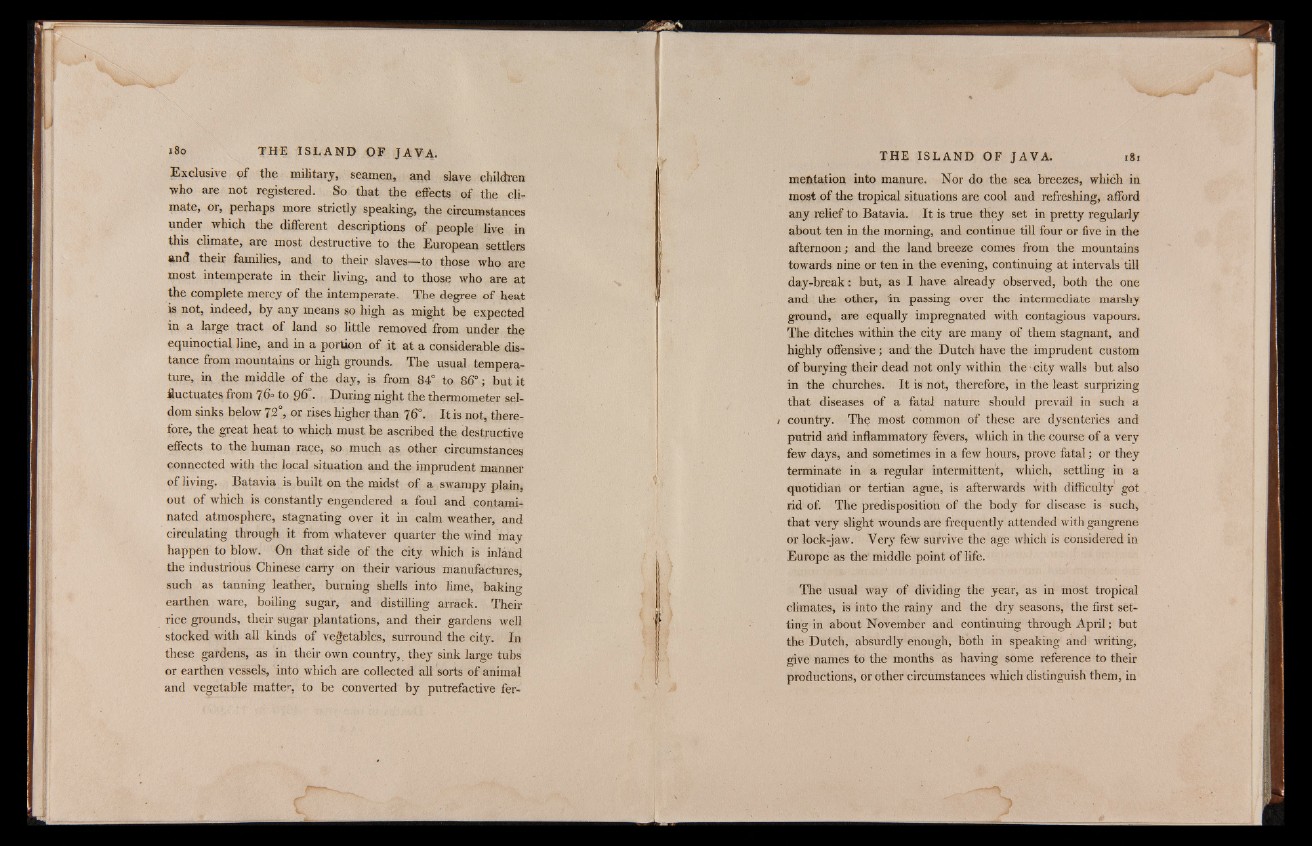
Exclusive of the military, seamen, and slave children
who are not registered. So that the effects of the climate,
or, perhaps more strictly speaking, the circumstances
under which the different descriptions of people live in
this climate, are most destructive to the European settlers
and their families, and to their slaves—to those who are
most intemperate in their living, and to those who are at
the complete mercy of the intemperate. The degree of heat
is not, indeed, by any means so high as might, be expected
in a large tract of land so little removed from under the
equinoctial line, and in a portion of it at a considerable distance
from mountains or high grounds. The usual temperature,
in the middle of the day, is from 84° to 86°; but it
fluctuates from 76° to 96°. During night the thermometer seldom
sinks below 72°, or rises higher than J6°. I t is not, therefore,
the great heat to which must be ascribed the destructive
effects to the human race, so much as other circumstances
connected with the local situation and the imprudent manner
of living. Batavia is built on the midst of a swampy plain,
out of which is constantly engendered a foul and contaminated
atmosphere, stagnating over it in calm weather, and
circulating through it from whatever quarter the wind may
happen to blow. On that side of the city which is inland
the industrious Chinese carry on their various manufactures,
such as tanning leather, burning shells into lime, baking
earthen ware, boiling sugar, and distilling arrack. Their
rice grounds, their sugar plantations, and their gardens well
stocked with all kinds of vegetables, surround the city. In
these gardens, as in their own country, they sink large tubs
or earthen vessels, into which are collected all sorts of animal
and vegetable matter, to be converted by putrefactive fermentation
into manure. Nor do the sea breezes, which in
most of the tropical situations are cool and refreshing, afford
any relief to Batavia. It is true they set in pretty regularly
about ten in the morning, and continue till four or five in the
afternoon; and the land breeze comes from the mountains
towards nine or ten in the evening, continuing at intervals till
day-break: but, as I have already observed, both the one
and the other, in passing over the intermediate marshy
ground, are equally impregnated with contagious vapours.
The ditches within the city are many of them stagnant, and
highly offensive ; and' the Dutch have the imprudent custom
of burying their dead not only within the ■ city walls but also
in the churches. I t is not, therefore, in the least surprizing
that diseases of a fatal nature should prevail in such a
/ country. The most common of these are dysenteries and
putrid and inflammatory fevers, which in the course of a very
few days, and sometimes in a few hours, prove fatal; or they
terminate in a regular intermittent, which, settling in a
quotidian or tertian ague, is afterwards with difficulty got
rid of. The predisposition of the body for disease is such,
that very slight wounds are frequently attended with gangrene
or lock-jaw. Very few survive the age which is considered in
Europe as the middle point of life.
The usual way of dividing the year, as in most tropical
climates, is into the rainy and the dry seasons, the first setting
in about November and continuing through April; but
the Dutch, absurdly enough, both in speaking and writing,
give names to the months as having some reference to their
productions, or other circumstances which distinguish them, in